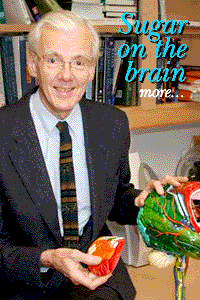|
|
|
|
|||||||
|
Princeton neuroscientist Bart Hoebel with a model of the brain. |
|
Study shows sugar dependence in rats It's a common refrain: "I'm addicted to sugar." Now a
study by Princeton University psychologists suggests that
such urges really may be a form of addiction, sharing some
of the physiological characteristics of drug dependence.
Sugar, said Hoebel, triggers production of the brain's natural opioids. "We think that is a key to the addiction process," he said. "The brain is getting addicted to its own opioids as it would to morphine or heroin. Drugs give a bigger effect, but it is essentially the same process." Hoebel emphasized that there are more elements to addiction than bingeing and withdrawal, and that further studies will be needed to complete the picture. Also, it is not clear how closely the findings might apply to humans, he said. The greatest value of the research, Hoebel said, is that it provides an animal model of sugar dependency, allowing scientists to probe more deeply the connections between food cravings and brain physiology. As far as the plight of the many people who feel powerless in the face of sugar, it also is not clear how the findings will help, he noted. "Unfortunately, it's very difficult to treat addictions," he said. "But it does change the way the person might look at it. It puts it in the realm of an addictive disorder rather than a failure of willpower." more... |
|||||||
|
|
|
|
|||||||
|
University home | Previous caption pages | Communications Office | Web page feedback © 2002 The Trustees of Princeton University |
|||||||||
